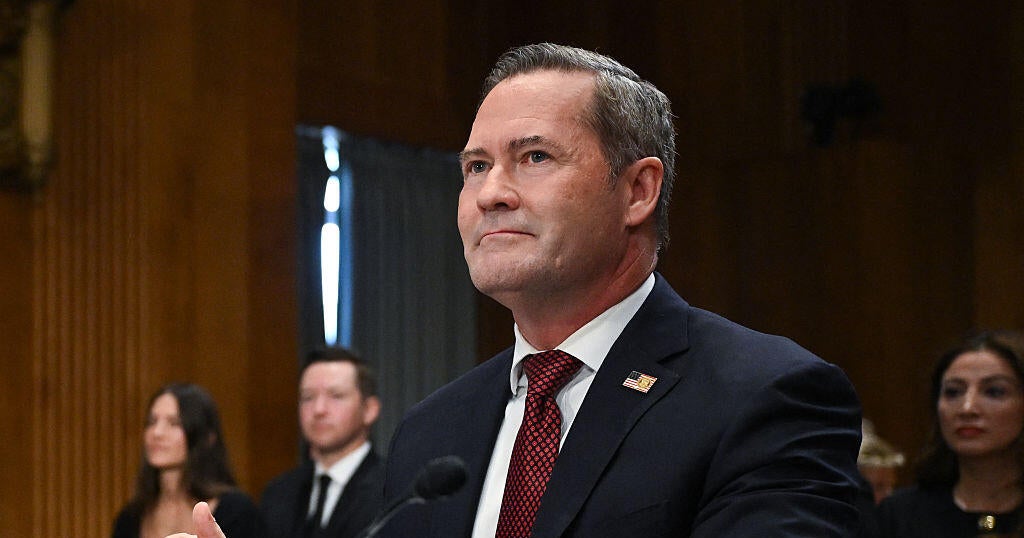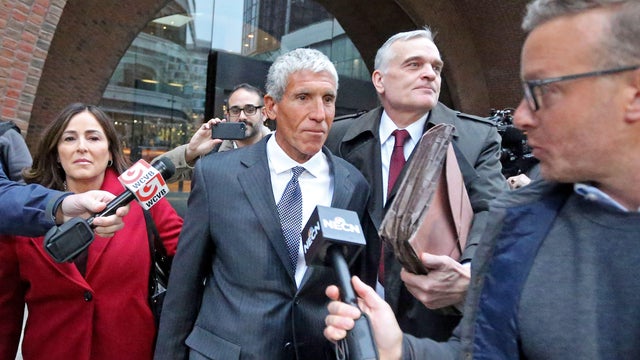

No response returned

Washington — Mike Waltz, President Trump's former national security adviser, testified Tuesday at his Senate confirmation hearing to be U.S. ambassador to the United Nations, where he fielded questions about the administration's foreign policy and his plans for the role if he is confirmed.
The hearing before the Senate Foreign Relations Committee was the first opportunity for lawmakers to publicly question him about his role in a Signal chat in which top administration officials about a military strike in Yemen.
In the weeks following the scandal, Democrats said they expected the hearing would be "brutal" for Waltz, but the Signal controversy did not come up until more than an hour into the hearing, which focused mostly on the administration's approach to China, Israel and the work of U.N. agencies around the world.
The role of U.N. ambassador — — has been vacant for six months, leaving the U.S. without a top representative on a major world stage as several international crises play out. Waltz is likely to be confirmed, given Republican control of the Senate. Waltz would take the position as Mr. Trump's frustrations increase with Russia over its refusal to end its war in Ukraine and as the U.S. seeks to manage tensions with China and Iran.
Republican Sen. Mike Lee of Utah introduced Waltz as "one of the most well-qualified U.S. ambassador nominees to the United Nations ever," calling him a "seasoned policy mind" and "skilled negotiator."
"With Waltz at the helm, the U.N. will have what I regard as what could and should be its last chance to demonstrate its actual value to the United States," Lee said.
Republicans used the hearing to criticize the U.N., accusing it of being politicized and working against the U.S. and its allies, despite the U.S. being the largest donor. Earlier this year, Mr. Trump ordered a general review of U.S. funding and involvement in the global body.
"You've got a heavy lift here," said Republican Sen. James Risch of Idaho, the chairman of the committee.
Waltz agreed that the U.N. needs "major" reform, but said there's "good and meaningful work to be done."
"We should have one place in the world where everyone can talk, where China, Russia, Europe, the developing world, can come together and resolve conflicts," he said. "But after 80 years, it's drifted from its core mission of peacemaking."
But Democrats argued that a pullback would be at odds with U.S. interests because it would give China more influence.
"China is all too eager to take advantage of our disengagement at the U.N. and around the world. And while we may not all like what some U.N. institutions do, if we aren't at the table, we can't influence the agenda," said Sen. Jeanne Shaheen of New Hampshire, the top Democrat on the committee.
Waltz responded that it was "absolutely critical" for the U.S. to be at the table to counter China's growing influence.
Republicans also accused the U.N. of being a "hotbed of antisemitism" and asked Waltz if he would commit to vetoing "one-sided anti-Israel resolutions."
"Yes, I'll make that commitment," Waltz said.
Democratic Sen. Chris Coons of Delaware was the first to question Waltz about the Signal scandal, scolding him and the Trump administration for its handling of sensitive details about a military strike. But Waltz maintained that there was no classified information shared in the chat and defended the use of the app as "not only authorized, it's still authorized and highly recommended."
Waltz told Coons that no disciplinary action had been taken by the White House, while the Department of Defense is still conducting its investigation.
"There's been no consequences, and yet the president continues to denounce those who leak information," Coons said.
Democratic Sen. Cory Booker of New Jersey called on Waltz to take accountability for the disclosure, telling him that he showed "profound cowardice" in how he handled the incident.
"I cannot support your nomination," Booker said. "That's not leadership when you blame people that tell the truth. That's not leadership when you can't say the words, 'I made a mistake. I could have done better. I learned valuable lessons from this experience.' Instead, at a moment where our national security was clearly compromised, you denied, you deflected and then you demeaned and degraded those people who objectively told the truth and criticized your actions."
Waltz was ousted as Mr. Trump's national security adviser in May, weeks after the editor in chief of The Atlantic, Jeffrey Goldberg, revealed that he had unexpectedly been added to a group chat on the encrypted messaging app by a user with Waltz's name. Defense Secretary Pete Hegseth shared sensitive details of an upcoming military operation in the chat, which included others like Vice President JD Vance and Secretary of State Marco Rubio.
The story ricocheted through Washington, with Democratic lawmakers into why highly sensitive information was being discussed on a commercially available messaging app, rather than secure government channels.
Administration officials acknowledged the conversation was "sensitive" but denied that the operational details shared in the chat were classified. Waltz admitted that he created the chat, but denied knowing how Goldberg's contact information got into his phone.
Sources previously TheNews that Waltz's nomination for the ambassador role, a high-profile post in New York, was a last-minute decision by the president, and that the Signal controversy was one of the factors that led to his departure from the National Security Council.
On Tuesday, Waltz denied being fired from the national security role and said he was kept on at the White House as an adviser.
Mr. Trump named Waltz as his national security adviser, a position that does not require Senate confirmation, days after the Florida Republican was reelected to a fourth term in Congress. The pick cut into Republicans' narrow majority in the House and Speaker Mike Johnson, a Louisiana Republican, pleaded with Mr. Trump not to poach any more members for administration roles.
The slim majority stalled Mr. Trump's first choice for U.N. ambassador, Republican of New York. When nominating Waltz, Mr. Trump said he had asked Stefanik to remain in Congress, where she could help advance his legislative agenda.




